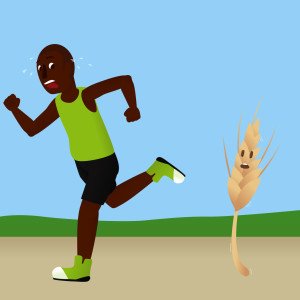Fad or Fact? A Review of Grain Brain
 David Purlmutter, MD, author of the recently-published book, Grain Brain, promises that his program will make you, “feel more confident and have more self-esteem. You’ll feel younger and more in control of your life and future.” And that’s not all! Purlmutter goes on to say that his very low-carbohydrate, high-fat diet will improve insulin sensitivity, lower the risk of diabetes, “melt fat away,” and “treat Alzheimer’s disease.” It sounds too good to be true. Unfortunately, that seems to be the case.Although the book is geared toward improving brain health, it is clearly a diet book. The Grain Brain’s four-week plan consists of reducing calorie intake, but tells the user not to count calories. Carbohydrate intake should be fewer than 60 grams, but there is no lesson on how to count carbohydrates. The book does state, incorrectly, that 60 grams of carbohydrate is equal to one piece of fruit, but no other counts are given throughout the menu planner or the pages of recipes. Purlmutter states emphatically that gluten is the root of all evil; claiming that it causes terrible damage to our brains. He recommends regular exercise and a number of supplements that can be purchased on his website.In Grain Brain, Purlmutter contradicts himself a number of times. He states that we are genetically and physically identical to the Paleolithic people, and that the origin of brain diseases, including ADHD, chronic headaches, dementia, and Alzheimer’s, lies in our high-carbohydrate diet. Therefore, we should consume a diet high in meat and oils instead. Ketosis is the goal. According to Purlmutter, ketosis is safe and ketoacidosis is a rare occurrence because we have evolved to handle ketones. So, are we genetically similar to our ancient ancestors or have we evolved?The book is filled with lessons in biology, especially with regard to brain function and the body’s response to food. Some of the science is true, but much of is backed by either a vague connection or no science at all. For instance, Purlmutter writes that our brains don’t need glucose from food because our bodies manufacture it. He asserts that food sources of glucose cripple our insulin receptors. This stretch of science had a footnote, but the cited article was from an opinion piece in The New York Times, not a scientific study.The Grain Brain diet falls short of its claims. While some of Purlmutter’s suggestions may work to improve brain health, the program as a whole is not based in the current dietary standard of solid, scientific research.By Beth Rosen, MS
David Purlmutter, MD, author of the recently-published book, Grain Brain, promises that his program will make you, “feel more confident and have more self-esteem. You’ll feel younger and more in control of your life and future.” And that’s not all! Purlmutter goes on to say that his very low-carbohydrate, high-fat diet will improve insulin sensitivity, lower the risk of diabetes, “melt fat away,” and “treat Alzheimer’s disease.” It sounds too good to be true. Unfortunately, that seems to be the case.Although the book is geared toward improving brain health, it is clearly a diet book. The Grain Brain’s four-week plan consists of reducing calorie intake, but tells the user not to count calories. Carbohydrate intake should be fewer than 60 grams, but there is no lesson on how to count carbohydrates. The book does state, incorrectly, that 60 grams of carbohydrate is equal to one piece of fruit, but no other counts are given throughout the menu planner or the pages of recipes. Purlmutter states emphatically that gluten is the root of all evil; claiming that it causes terrible damage to our brains. He recommends regular exercise and a number of supplements that can be purchased on his website.In Grain Brain, Purlmutter contradicts himself a number of times. He states that we are genetically and physically identical to the Paleolithic people, and that the origin of brain diseases, including ADHD, chronic headaches, dementia, and Alzheimer’s, lies in our high-carbohydrate diet. Therefore, we should consume a diet high in meat and oils instead. Ketosis is the goal. According to Purlmutter, ketosis is safe and ketoacidosis is a rare occurrence because we have evolved to handle ketones. So, are we genetically similar to our ancient ancestors or have we evolved?The book is filled with lessons in biology, especially with regard to brain function and the body’s response to food. Some of the science is true, but much of is backed by either a vague connection or no science at all. For instance, Purlmutter writes that our brains don’t need glucose from food because our bodies manufacture it. He asserts that food sources of glucose cripple our insulin receptors. This stretch of science had a footnote, but the cited article was from an opinion piece in The New York Times, not a scientific study.The Grain Brain diet falls short of its claims. While some of Purlmutter’s suggestions may work to improve brain health, the program as a whole is not based in the current dietary standard of solid, scientific research.By Beth Rosen, MS


